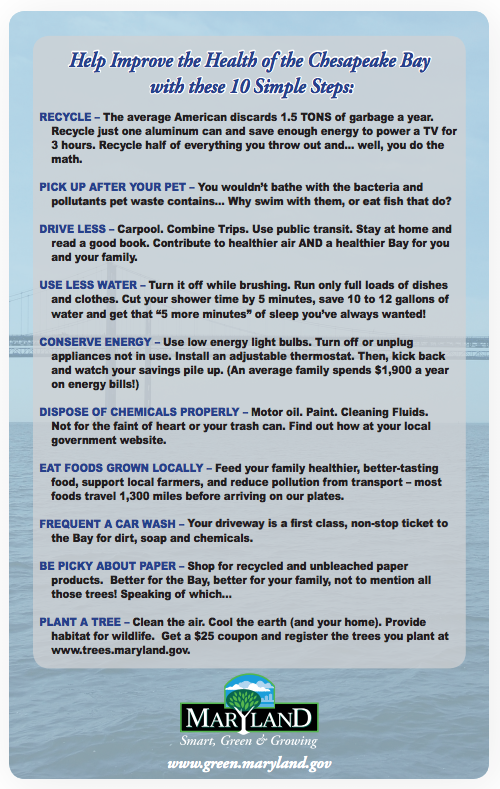Let us stipulate, as the lawyers say, that the primary goal of everyday writing is to communicate clearly.
How, then, would you grade this brochure produced by Maryland’s BayStat initiative?
BayStat, the brainstorm of former governor and current presidential candidate Martin O’Malley, aims to use data to guide the restoration of the Chesapeake Bay.
The bay’s degradation has been severe. Sealife of all kinds–from many species of fish to the grasses which once made the estuary an underwater savannah–has been threatened for generations. Runoff of nitrogen and phosphorus and sediment has seriously degraded 250-mile long bay and its rivers and streams. So has overfishing. The natural elements that once sifted these pollutants–forests and fields, swamps and bending riverways–have themselves been decimated and degraded.
For a generation, people like O’Malley have been working to restore the bay to health.
This simple checklist of “10 simple steps” advises Sam and Suzy Citizen what they can do.
The problem is that the list is a grab-bag of unlike things. It’s as if I sent you shopping with this list: toothpaste, organic spinach, socks, milk, pencils, corn, coffee, a baseball hat, cat food, and this morning’s New York Times.
To understand ideas, people need similar ideas to be chunked together. Maryland’s list for Sam and Suzy is valid. But they’re not going to understand or remember their civic duty unless similar ideas are “chunked” together.
Like this:
At home
- Recycle
- Use less water
- Conserve energy
- Plant a tree
Shopping
- Eat foods grown locally
- Be picky about paper
Out and about
- Drive less
- Pick up after your pet
- Dispose of chemicals properly
Chunking is easy but it makes a huge difference.
Whatever you write–memos, emails, flyers, articles, papers, and so on–make sure you chunk ideas so the reader can absorb and use those ideas easily.
For more posts on writing, visit the Elements of Writing Blog. Check out the posts on Storytelling, Writing Mechanics, Analysis, and Writers on Writing.


